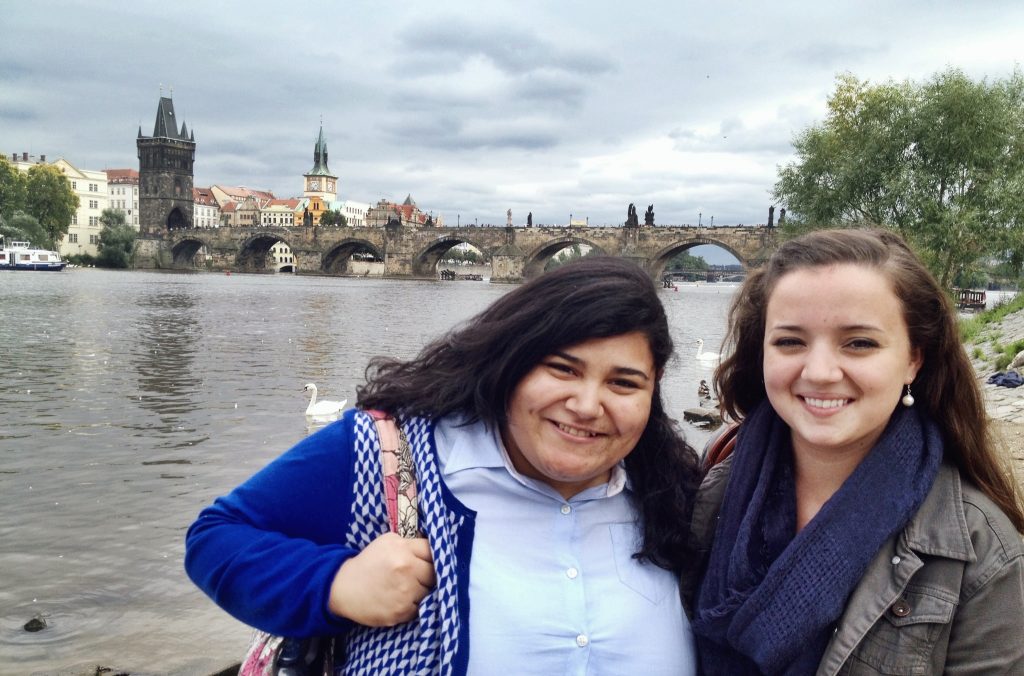Viewing the Ashbrook Approach from Abroad
December 24, 2020


A semester abroad helped September Long and Johanna Mateo realize the value of their education as Ashbrook Scholars. Last fall, they studied in Prague, the capital of the Czech Republic. They went to experience one of Europe’s most beautiful cities, to travel in other countries, and to test their academic mettle. They enrolled at the Anglo-American University, a small private school that enrolls students from throughout Europe and offers instruction in English. But while the language was the same, the approach to education was entirely different from Ashbrook’s.
Mateo and Long are both political science and history majors. In the Ashbrook Scholar program, they have studied the art of politics by reading classic political theory of Plato, Aristotle, and Locke as well as primary documents (speeches, letters, and essays) of American statesmen like Jefferson, Madison, and Lincoln. “We get inside the heads of the authors” of these texts, Long said; “we talk about what they meant with professors and our peers, considering the principles they believed in.”
Mateo and Long were attracted to the strong international studies program at the Anglo-American University. But the courses there applied a scholarly lens. Students were not invited to study political thinking directly; they were expected to absorb the current academic interpretation. Professors lectured and assigned secondary sources as readings. “There was not much room for challenging the scholarly opinion. If we questioned an argument, we were told we needed to read more scholarship,” Mateo said.
Class discussions avoided fundamental questions of right and wrong. Professors did not address such questions as “What is justice?” This meant, Mateo said, “You could not even agree on what you were disagreeing on.” Long described a lecture in her class on “Multiculturalism in Europe” which addressed discrimination against the Roma people, the displaced ethnic group commonly referred to as gypsies. To explain how the Roma are mistreated, the professor pointed to goals listed in the Council of Europe’s Convention on Human Rights, “progressive measures” that 47 nations in Europe—including many that at the time were Soviet block nations—endorsed in 1950, without really implementing. The Convention fails to distinguish between the inherent rights of human beings and the social conditions that people strive for to make their lives better. Describing her professor, Long said, “it sounds silly—since she was very well educated in the usual sense—but she had not looked into the underlying principle of human equality.”
Taking a course on global security, Mateo and Long heard America criticized for an overbearing presence on the world stage. Other American students in the class, most from Midwestern liberal arts colleges, did not try to counter this perspective. They “seemed infatuated with Europe, or trying to fit into the European mindset, ” Mateo said. When the Ashbrook students challenged a Dutch professor on his critique of US foreign policy, other Americans were “a little taken aback.” But the professor himself gradually opened up. “At the end of the course, he took us aside and said he had rarely before taught students who made arguments based not on their feelings, but on careful reasoning.”
Reading the scholarly opinion gives a student broader awareness if one is prepared to examine it critically. Mateo was glad that as an Ashbrook Scholar, “I had learned to be a free thinker.” Long concluded that the kind of study done in most other programs is biased and easily forgotten. But Ashbrook study gives access to real truths that “you can allow to change you.”

